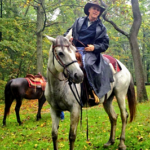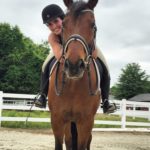
Tap, tap, tap, “OUCH!”
Tap, tap, tap, “OUCH!”
The tapping and the ouching came from our front yard, and I knew the voice all too well. Some farms have roosters who call at daybreak. Our farm has a landlady.
It had been weeks since my alarm clock woke me up on a weekend morning. In exhausted opposition to the first 33 years of my life, I now rise earliest on Saturdays and Sundays. I thought the cool, fall weather might curb our landlady’s weekend trips from New Jersey to do yard work in North Carolina. No such luck. I still look confusedly forward to Mondays, when I can catch up on my sleep.
My wife, Kimberly, didn’t move as I left the bed, dressed and went downstairs. In an effort to be healthy, I made a cup of honey-sweetened green tea and carried it with me to the front window. I sipped in my antioxidants as I watched our landlady, Rachael, drive railroad spike-sized nails into the trees in our front yard.
Tap, tap, tap, “OUCH!”
By the time I’d refilled my tea and gone outside, Rachael was using a pair of pliers to steady the large nails. She held the pliers awkwardly in her heavily-bandaged left hand and drove them in using a hammer in her right. She had impaled most of the trees in the front yard–about 20 or so–with the giant nails, which jutted out in every direction. I could hear the barn phone ringing. I should have left to answer it before Rachael had a chance to explain her vandalism.
“They need a home, too, you know,” Rachael said, taking a few practice swings with the hammer.
“What?” I asked. “The nails?”
“OUCH!” Rachael hollered as a huge nail ricocheted off her forehead. The practice swings didn’t seem to be helping. Rachael gingerly rubbed a reddening welt just below her hairline. “The birds need a home,” she said. “It’s supposed to be a cold winter, so my nephew’s Boy Scout troop built a whole mess of bird houses to get their aviation badges–TOMMY!”
She screamed her husband’s name so loudly that I dropped my piping-hot cup of antioxidants. Tommy came running, sweaty and out of breath from carrying a large, half-crushed cardboard box marked “BIRDHOSES.” He dropped it at her feet, and it buckled, dumping out a pile of red, yellow and blue chunks of wood.
These were only birdhouses in spirit, with inch-wide gaps between their uneven walls and topped with lopsided roofs. Each little house was held together with about eight pounds of nails, so that they more closely resembled torture devices fit for a tiny, colorful Inquisition. I could hear the barn phone ringing again. As I left, Rachael and Tommy began hanging the birdhouses on the trees. If any bird ever got past all the nails and through the dime-sized front door, the poor creature would end up with motion sickness every time the wind blew.
In the barn, the horses stood silently in their blankets. The barn phone rang again.
“Hello,” I said.
“Who is this?” asked the person on the other end.
“I don’t know,” I replied. “Who were you calling?”
“Oh–it’s not like that man, like–I mean, the woman who came in and bought cigarettes, like, left this cell phone here. I work at the Gas-N-Sip on Highway 42, and this is, like, the last number she dialed. So, I thought you would know who owns this phone.”
I looked at the number on the caller ID display. No bells rang, anywhere.
“I have no idea who owns that phone, but I’ll let everyone who comes by know that you have it,” I said.
“Tell them to call this cell–I’ll, like, keep it with me,” said the voice. The voice paused for a moment. “It looks like one of those ‘unlimited phones,’ so, is it okay if I make some phone calls?”
“What?”
“Is it cool if I use this phone to make some calls?” the voice repeated.
“Um…” I began. “Okay, but only if you call your mother first.”
“Sweet!” exclaimed the voice, and the call ended.
I hung up our phone. The barn was still quiet. The horses looked like I felt–sleepy–as they squinted against the morning sunlight. A few of them snorted and shook themselves awake. The few horses not awake by the time I walked to the feed room were roused when I opened the feed bins. I like that sound, too. I have a long list of favorite sounds and a lot of them are barn sounds.
I can be miles away from any barn and easily conjure up that comforting symphony: dry beet pulp scooped in plastic; pelleted grain poured from a heavy, paper sack; the snapping lids on supplement containers; the breathy whine of a deep, no-freeze water spigot or the ever-familiar thump of a full feed bucket’s steel handle falling against its tough, plastic rim. It’s relaxing music.
I enjoyed the sounds as I mixed the horses’ food. I could see the horses’ breath as they nickered impatiently for their buckets. It was still a bit before feeding time, so I figured some molasses and peppermint treats might be okay. They weren’t bad–but they would have been even better with some of that tea I spilled.
Our Australian Shepherd d mix, Hazel, began barking at a vehicle coming up the drive to the barn. A silver sports car with Texas plates came up the drive and, slowing only slightly, drove across the grass and headed into the barn aisle.
“WHOA!” I hollered. “WHOA! WHOA! STOPSTOPSTOPSTOP!”
The car jerked to a halt with its front tires inside the barn. I stared in disbelief, my mouth wide open. An older woman with puffy, burgundy hair stepped out of the car.
“You’re in my way!” she said. A lit cigarette hung from her bottom lip. It jumped with every syllable as she spoke. Ash fell across the front of her sweater.
“Excuse me?” I responded. I looked around for a camera crew; surely this was one of those prank-playing reality television shows.
“I’m here about a job, and it looks like rain, so I’m using your boss’s garage–now, shoo!” she made short, choppy sweeping motions with her hand.
“THIS IS A HORSE BARN, NOT A GARAGE! YOU’LL PARK OVER THERE BY THE SIGN THAT SAYS ‘PARKING.'” I spoke so loudly that I startled myself. I would still consider what I did to be “speaking,” but if it had been any louder, I would have had to call it “shouting.”
“Now, SHOO!” I said, making my own short, choppy sweeping motions with my hand.
With a huff, she got back into her still-running car and backed out of the barn, nearly taking out several lengths of fencing before crossing the gravel drive and coming to a stop in a nearby field. I had never seen this woman before, there was no job available here and the sky was completely clear. I took another quick look around for that camera crew. She came walking up, not watching where she was going. She was too busy trying to light a second cigarette, using the first one, which was now little more than a smoldering filter.
“You need to put both of those out, please,” I said.
“And you need to tell your boss that Patti–with an ‘i’–is here,” she responded.
“I AM THE BOSS! THERE IS NEITHER PARKING NOR SMOKING IN THIS BARN OR ANY OTHER BUILDING ON THIS PROPERTY!” I shouted. Patti shrugged her shoulders and tossed the cigarettes into a nearby water trough. She pushed past me and stepped into the barn.
“They’re in cages!” She exclaimed. “This’ll be a cinch!”
“YOU!” I shouted, pointing at her, and then at the bench in the barn aisle. “SIT! SIT DOWN, RIGHT NOW!” Patti sat down. “Who are you and what exactly are you doing here?” I asked her.
“I’m Patti–with an ‘i.'” she said sheepishly. “I’m an accountant–well, I was an accountant. My boss said I was too good with people to work with them anymore. She suggested I try working with animals instead.”
“Okay,” I said. “But why did you come here?”
“Because I want to work with cows,” Patti replied.
“Cows?” I asked. “Did you grow up in the city?”
“Yes,” she responded, “but I love cows.”
At this point things could have gone anywhere, but I was tired of trying to fight the craziness of our farm. I figured I should just redirect or channel it.
“All right!” I began. “You’re just what we’ve been looking for. Now, understand–it’s just an apprenticeship, so there’s no pay. But, you’ll know right away if working with ‘cows’ is for you. I’ll personally show you some of the basics.”
“Can I take home some of the milk?” Patti asked.
“Milk?” I responded “If you can get milk out of these cows, it’s all yours! The buckets are–”
Patti ran off before I could finish. She was reaching underneath a rather confused-looking Vander when I found her only moments later.
“No, Patti! No!” I hollered. (I was doing entirely too much hollering.) “Don’t do that! Heavens! I was just kidding, Patti. Please step away from the animal. I’m sorry if I misled you, but these are not milk cows. There’s no milk. None. None at all.”
Patti looked completely dejected.
“Look,” I continued, “I’m sorry if I gave you the wrong impression. These animals just aren’t like that. And I realize it’s a little dark in the barn, but these are horses, not cows. Look, I don’t have a clue why you’re here, but here you are. Let me show you how to take care of a horse barn. We can mix their food, groom and blanket these guys. I think you’ll have a real knack for it! Who knows, maybe it’ll help you figure out what you want to do with your future!”
“All right,” Patti said halfheartedly.
I showed her all the basics: mucking a stall, soaking beet pulp, measuring grain, using a curry, using a brush, picking a hoof, scrubbing a water trough, identifying some basic types of hay and blanketing a horse. I answered all her questions, and she took copious notes.
It was already mid-afternoon. Patti had been introduced to all the horses in the barn as well as the boarders who’d come out during the day. We’d covered a lot of ground, and I expected Patti to be completely overwhelmed by her new job. Surprisingly, she seemed only eager and enthused to learn more.
“Rather than trying to take it all on today,” I said, “how about you clean the last few stalls, and we’ll start fresh with the other stuff tomorrow?”
Patti just smiled, grabbed the muck rake and set to work. As I refilled a trough, I looked out across the rear pasture at her car, parked in the field. There’s never a dull day on a horse farm.
Despite our rough start, I was starting to like Patti. Besides, if I could handle the barn, I figured just about anybody could. I was feeling a little proud of her and myself. We were like a couple of old dogs learning new tricks. Maybe there’s hope for us city folk after all.
Jeremy Law and his wife, Kimberly, live on a small farm in North Carolina with their two cats, two dogs and two horses.
Read Jeremy’s other columns in EquiSearch.com’s Humor section and share your comments in the forum.







